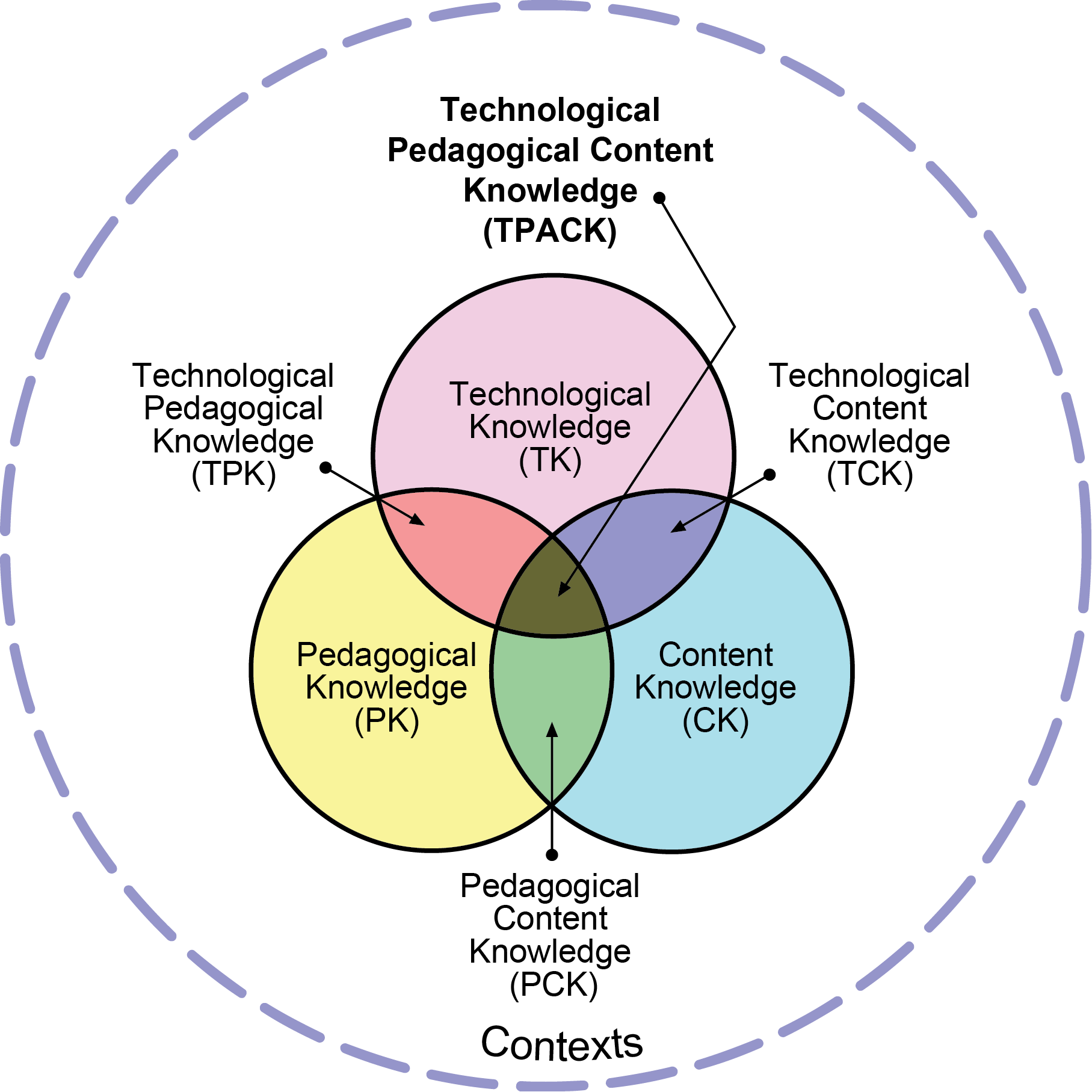TPACK: Technology, Pedagogy, and Content Knowledge
Lauren Hays
Librarians who design instruction know it can be challenging to see how everything you need to teach and do in a learning setting fits together. One of the best frameworks I have found for thinking about learning environments holistically is TPACK.
TPACK stands for technology, pedagogy, and content knowledge. You can see an image of the framework below:

Image available under a Creative Commons License here:
https://commons.wikimedia.org/wiki/File:TPACK-new.png
Each of the TPACK components is part of what you should be thinking about when you design an instruction session. All of them together create the best learning environment.
When using TPACK, I have found it is best to start with the content knowledge. Typically, I have a topic that I need to instruct on and it is important that I understand that topic well enough to share it with others.
Once I have a grasp on the content, I start thinking about how I want to teach the content. In other words, I consider the pedagogy I need to use in order for the individuals to learn. This is where pedagogical knowledge comes in. In order to develop pedagogical knowledge, you need to know various pedagogical methods (i.e. active learning strategies, assessment strategies, feedback strategies) and then be able to select one that fits with the content.
Finally, it is necessary to think about the technology that you will use in the instruction session. You also need familiarity with various technology tools that you can use in a learning environment and be able to select one that fits with the pedagogy and content.
Let’s look at this using a specific example.
You were recently asked to lead an instruction session on systematic reviews for stakeholders at your place of employment. This is a topic you are familiar with and know you have the necessary content knowledge in order to teach it to others. However, you have not taught a group of people on systematic reviews before so you need to take time to consider the pedagogy and technology you will use.
As you reflect on what is important about systematic reviews and what stakeholders need to know, you decide you will do the following during the class session:
- Explain what a systematic review is (lecture for no more than 10 minutes)
- Ask individuals to locate a systematic review (searching in the library database for no more than 15 minutes; you may need to demonstrate how to use the library database)
- Ask individuals to identify specific elements of the systematic review (no more than 5 minutes)
- Discuss how your organization uses systematic reviews (class discussion of no more than 10 minutes)
- Leave time for questions (no more than 10 minutes)
These plans for the class are the pedagogies you plan to use. You will also give feedback as you walk around the room and be able to assess how much the students understand about systematic reviews from the class discussion and questions.
Lastly, you need to determine the technology that best fits in the class. Looking closely at your pedagogy, you know you will need computers for each attendee, access to the library databases, a projector, and a screen.
All of your plans together get you to the middle section of the TPACK framework.
While I went through the parts of TPACK in a linear order (content→ pedagogy→ technology), it is not necessary that you use that model. You may feel that you need to start with the technology because you will be instructing in a new room with new technology and you want to know what you can do in the room before you decide what content is best to lead an instruction session on next.
Recommended Resources
Koehler, M., & Mishra, P. (2009). What is technological pedagogical content knowledge (TPACK)?. Contemporary issues in technology and teacher education, 9(1), 60-70.
Koehler, M. J., Mishra, P., & Cain, W. (2013). What is technological pedagogical content knowledge (TPACK)?. Journal of education, 193(3), 13-19.
Polly, D., & Brantley-Dias, L. (2009). TPACK: Where do we go now?. TechTrends, 53(5), 46.
Lauren Hays
Lauren Hays, PhD, is an Assistant Professor of Instructional Technology at the University of Central Missouri, and a frequent speaker on topics related to libraries and librarianship. Her professional interests include information literacy, educational technology, library and information science education, teacher identity, and academic development. Please read Lauren’s other posts about skills for special librarians. And take a look at Lucidea’s powerful integrated library systems, SydneyEnterprise, and GeniePlus, used daily by innovative special librarians in libraries of all types, sizes and budgets
Never miss another post. Subscribe today!
Similar Posts
Teaching about AI in the Workplace
Suggestions for special librarians from Claude on how to foster cross-generational AI learning communities in the workplace.
Keeping up with AI…
Resources for staying current on the quickly changing AI landscape from a library expert.
Interview with Lesley Farmer about SLA’s Information Outlook
Interview about the rebirth of SLA’s Information Outlook as a quarterly online publication with interview with Professor Lesley Farmer
Ways I Have Been Using Generative AI
Generative AI can be used in many ways as part of a typical workflow; examples and thoughts about what the future holds




Leave a Comment
Comments are reviewed and must adhere to our comments policy.
0 Comments